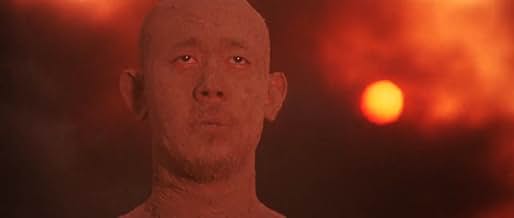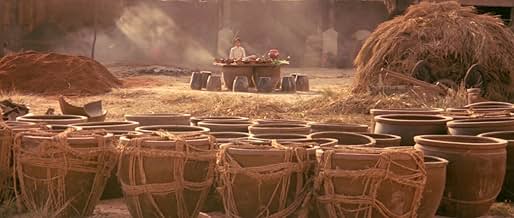Quando il padrone di un'azienda vinicola affetto dalla lebbra nella Cina del 1930 muore pochi giorni dopo il proprio matrimonio combinato, la sua giovane vedova è obbligata a gestire l'azien... Leggi tuttoQuando il padrone di un'azienda vinicola affetto dalla lebbra nella Cina del 1930 muore pochi giorni dopo il proprio matrimonio combinato, la sua giovane vedova è obbligata a gestire l'azienda vinicola per potersi guadagnare da vivere, mentre si trova a combattere con i banditi, ... Leggi tuttoQuando il padrone di un'azienda vinicola affetto dalla lebbra nella Cina del 1930 muore pochi giorni dopo il proprio matrimonio combinato, la sua giovane vedova è obbligata a gestire l'azienda vinicola per potersi guadagnare da vivere, mentre si trova a combattere con i banditi, il suo amante alcolizzato e l'armata Giapponese che invade il paese.
- Regia
- Sceneggiatura
- Star
- Premi
- 17 vittorie e 7 candidature totali
- Wo Luohan Yeye (Uncle Luohan)
- (as Rujun Ten)
Recensioni in evidenza
This film is about the story of 'my grandmother and grandfather' in a rural village in Northern China. The story started from my grandmother who was on the way to her prearranged old husband's winery distillery factory. My grandmother, a young bride, was sent to get married with an owner of a wine distillery factory. After experiencing attack by a bandit, abduction, and mysterious death of her prearranged husband, my grandmother inherited that wine distillery. The story was ended by the death of my grandma during the period of Japanese invasion.
Off-screen voices adopted as one important dramatic element is unique characteristic of this movie. The plot is structured into a completed story by the "narrator"- I , the grandson of the protagonists. At the beginning, audiences can hear the off-screen voices arose: "I'll talk about my grandpa and my grandpa" (Red Sorghum,1988). The narrator did not appear in the movie, which makes him in the neutral objective position; in the other hand, he is the descendant of story characters, which makes him becoming a subjective participation to some degree. "I" was telling the story; and also I was told about my family history. Off-screen narration appear 12 times in the movie. The relationships between characters and the progress of plot at turning point depends on 'my narration', for example, the relationship between my grandma, her prearranged leprosy husband and sedan carriage worker (my grandpa); the mysterious death of leprosy husband, the process of my grandma abduction, the left of Uncle Lohan, and the appearance of Japanese troops. The integration of real family history and unreal story completely depends on my off-screen narrations, which helps the connection of past with present, the real with the unreal. The film narrative approach ultimately generates historical distant effects in time and space.
Cinematographic style is another prominent characteristic of the film. The director stylized the film with intense and rich red color. The screen is completely occupied by bright red color. At the beginning, a red scarf is filled with the whole screen; under the red scarf is my grandma's brighten young face with red makeup; the red sorghum stalk is glittered with the flash sunlight in the fields; the red sorghum wine liking rains is prayed around; the naked body is completely full of blood; and the world become the totally red after the mysterious total solar eclipse. At the end of the film, the flowing black red sorghum emphasized on the screen, which generates a brilliant and strong visual effect. This is not a realistic representation of time and space; it is the externalization of human innate desire for natural life and validity. Regardless of the plot, the extension of the red force gives audiences a pure emotional experience that is filled with wild and heroic.
Unlike other Chinese films of the same period, Red Sorghum is not a typical realism film. The director did neither tell a legend of China's farmers nor seek for " the national cultural root" (Ni, 2002). The film only wants to praise 'life, endless vitality, freedom, life expansion and stretch' (Ni, 2002).The sun is regarded as the origin of life. The brilliant red filled with the screen represents the mythology of "worship of the Sun" (Ni, 2002). Covered with a mysterious color, the director explores the significance of freedom and the nature of life, which goes beyond political ideology, social structure, and cultural differences. The themes going through the film are about the vitality and the freedom. The film expresses the desire for a liberated, plain and undistorted state. This is not the world what has been understood by people now; it is a world that concerns for the life rights of human being instead (Ni, 2002). Because the praise for vigorous vitality and freedom is an universal idea of human regardless of language and culture, this film won the international honors.
Overall, the high artistic achievement in cinematography and the uniqueness in plot structure make this film becoming one representative works of China's fifth generation filmmakers. Audiences can read the reconsideration for the nature of life, the future world as well as the destiny of mankind in that world known for us.
References Ni, Z (2002). Memoirs from the Beijing Film Academy: The Genesis of China's Fifth Generation. translated by Chris Berry. Durham, NC: Duke University Press.
Red Sorghum (1988) Yimou Zhang
Until I saw this film, I would have never thought that one could say so much about character, setting, mood and plot simply through the use of layout and image composition. This controversial film set in the 1920's - 1930's, by the rebellious Zhang Yimou, follows the life of sorghum wine farmers from Northern China.
If you follow the history of Chinese film, you will see how nicely this film combines motif's of many of its precursor films. Chinese history and culture has been vastly explored through many Chinese films, however I believe that this is a good film for the average American film goer to get a taste of the Chinese film industry and culture through their perspective. I say this for a variety of reasons, the pacing of this drama is quicker and faster moving compared to other related Chinese films before its time. Generally Chinese film have a tendency to be slow, when set aside the general American preferred standards.
It presents to us some of the Northern Chinese cultural traditions. Its display of the Japanese brutality could not have been better presented. The Japanese have been quite swinish during this period in Chinese history. All I can say is it says it all as it really was, very well indeed.
This is the last but most important reason to watch this film... look at its cinematography. It has to be among the best I have ever seen. It amazed me to see how resourceful a cinematographer can be when working for a film of little budget. Yimou showed me how simple things can be filmed to be works of art. Unfortunately I have not been able to see the film in its original cinematic scope however, even in full screen it is still quite visually stunning. The aperture, f-stop and lens settings were set just perfectly giving the film a very rich vibrant look making Yimou my favorite Chinese film cinematographer/director of all time to date. Oh, it is a film that you just have to see for yourself! Hope you enjoy it! Happy Viewing!
Gong Li is stunning as usual. Check out Zhang Yimou as Brother Lohan. He displays such dignity. Muscle Man quite often steals the show with his bravado. The songs are uplifting and beautiful to hear. The scenery takes you away and the fields of sorghum are alive and pulling you in like Nature Herself.
While gutwrenching like his other movies, the characters in this one are especially endearing in their loyalty to each other. What more can I say. Poetry brought to life.
Lo sapevi?
- QuizThe films screenplay was based on the novel of the same name by Chinese author Mo Yan. In 2012, Mo Yan was awarded the Nobel Prize in Literature. The Swedish Academy awarded him the prize as an author "who with hallucinatory realism merges folk tales, history and the contemporary".
- ConnessioniFeatured in The Turandot Project (2000)
I più visti
- How long is Red Sorghum?Powered by Alexa
Dettagli
Botteghino
- Lordo in tutto il mondo
- 108.371 USD
- Tempo di esecuzione
- 1h 31min(91 min)
- Mix di suoni
- Proporzioni
- 2.35 : 1





















